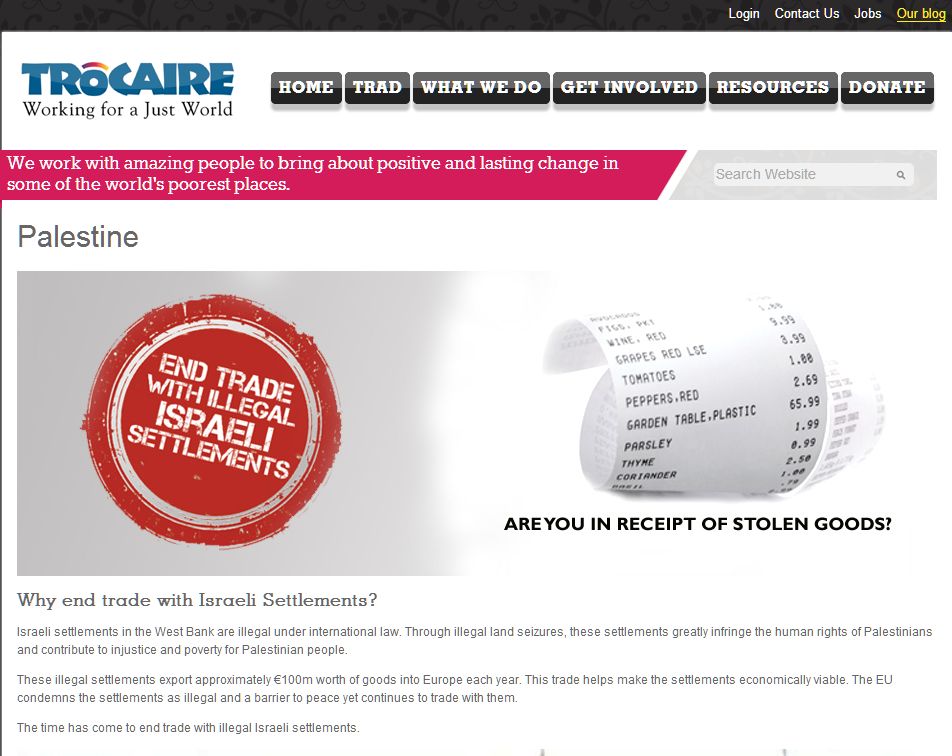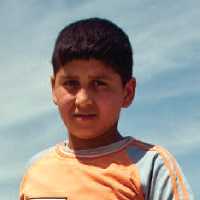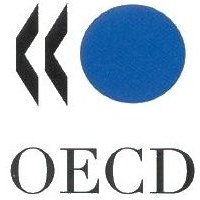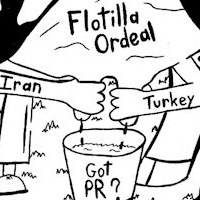![]()
Wed, Oct 3, 2012 | DooleyBlog | Dr. Mark Dooley
An excellent article by Dr. Mark Dooley explaining how Trócaire — the official overseas development agency of the Catholic Church in Ireland — is a funding mechanism for radical left-wing activism. This article is reprinted here with permission by the author.
Could someone please tell me why Trócaire is demanding a boycott of Israeli goods? Specifically, the charity is campaigning for an EU-wide ban on imports from ‘Israeli settlements’.
According to its executive director Justin Kilcullen, goods that ‘are produced on the back of house demolitions, land confiscation, racial segregation and military occupation must be banned so as not to provide economic support to the illegal settlements’.
Now, you may not agree with Israeli settlements on the West Bank. You may be pro-Palestinian, believing that Israel poses a greater threat to regional security than the despotic regimes which surround it. Even still, the question is whether this particular Irish charity should be mounting a campaign in favour of that cause.
I say this because Trócaire is no ordinary charity. It’s described as the ‘official overseas development agency of the Catholic Church in Ireland’. What’s more, its chairman is none other than Dr John Kirby, Bishop of Clonfert.
If, therefore, Trócaire is an official agency of the Catholic Church, I think it’s reasonable to assume that Irish bishops must support the charity’s proposed boycott.
At the very least, Bishop Kirby must have given the campaign his blessing. Either way, by not publicly distancing themselves from the campaign, the Irish hierarchy have implicitly endorsed a political cause which, I suspect, many Irish Catholics will consider objectionable.
This is how one reader reacted to news of the boycott last week: ‘We need to ask if money collected by children in the classrooms of Irish primary schools during Lent, should really be spent on giving aid and comfort to terrorist regimes in the Middle East by selectively promoting a boycott of Israeli goods.’
My own view is that such a campaign not only contravenes Catholic social teaching, but also undermines the essence of the charitable motive.
People give to charities to provide relief from poverty. In the case of Trócaire, they’re motivated by Christ’s injunction that ‘whatsoever you do to the least of my brothers, you do to me.’ For them, Christian charity should never be used as a cover for seeming left-wing activism.
Quite apart from the fact that Trócaire has never called for a boycott of rogue states like Zimbabwe or Iran, how can it justify using charitable donations to wage ideological crusades? If people wish to oppose Israel, they have every right to join the Ireland Palestine Solidarity Campaign. But on what basis can Trócaire assume that all of its supporters are pro-Palestinian? Most Catholics I know are strong defenders of Israel, not for religious reasons, but simply because they regard the country as a beam of democratic light in a swamp of dictatorship.
Still, they could never countenance their charitable contributions being used to orchestrate a campaign against those whose avowed aim is to wipe Israel from the map.
Of course, there is nothing new in all of this. During the Eighties, British charities such as Oxfam and Christian Aid mounted campaigns in favour of the Nicaraguan Sandinistas. Oxfam even published a booklet, ‘Nicaragua: The Threat of a Good Example?’, in which the charity urged its readers to canvass the British government and the then EEC to oppose American policy in relation to Nicaraguan Marxists.
Such campaigns did little for the reputation of those noble charities. Some commentators were forced to ask if Oxfam had become ‘another mask for dictatorial power’. Yet here we are, 25 years later, with Trócaire engaging in equally suspect politics.
On its website, Trócaire asks its supporters to email their local representatives to ‘demand strong EU action on [Israeli] settlements’. I have a better idea: Why don’t Trócaire supporters email the organisation to say no more donations will be forthcoming unless this campaign ends?
Better still, why don’t those who disagree with the boycott email Bishop Kirby inviting him to clarify the hierarchy’s position in relation to Trócaire’s campaign?
As I see it, this is a classic case of what Roger Scruton once called the ‘pestilence of pulpit politics’. By this he meant that it is often more attractive for clerics to engage with abstract political causes, such as the ‘Third World’, rather than ‘to work humbly in the ways of charity, which obliges us to help those concrete, knowable and often unlovable individuals whom providence has placed in our path’. And that is because the attention of the world is more readily ‘captured by the man with a cause, than by the man who merely attends to his duty’.
It’s for all of these reasons that I no longer give to Trócaire. Instead, I donate what little I can to the Society of St. Vincent de Paul, a Catholic charity whose volunteers work tirelessly for individuals whose sad plight never merits a political campaign.
They are our neighbours and friends who, quite tragically, have now become the least of our brothers.
There is no celebrity or prestige attached to such work. It’s simply an example of the meaning of charity which, as the ever-compassionate Charles Dickens insisted, should always begin at home.
Dr Mark Dooley is an Irish philosopher, author and broadcaster. Since 2006, he writes for the Irish Daily Mail, where his ‘Moral Matters’ column appears weekly. You can contact hem by email at mark.dooley@dailymail.ie.



 RSS
RSS












“Quite apart from the fact that Trócaire has never called for a boycott of rogue states like Zimbabwe or Iran, how can it justify using charitable donations to wage ideological crusades? If people wish to oppose Israel, they have every right to join the Ireland Palestine Solidarity Campaign. But on what basis can Trócaire assume that all of its supporters are pro-Palestinian? Most Catholics I know are strong defenders of Israel…”
Well said. As a Catholic charity, which has for the most part a bedrock of Catholic support, they have a responsibililty to fully advise over this activity. Christians form probably the most vocal element of support for Israel in Ireland (and elsewhere) today. There is no reason to assume these people would be OK with a distinctively hardline political activism against Israel. I think it’s justified to assert that using donations for such an overtly non-charitable purpose constitutes misappropriation of funds.
Trocaire’s agenda is also revealed by the fact it employs two people in senior positions that are closely associated with extremist group the IPSC.
[…] follow up by Dr Mark Dooley to his previous Trócaire articles (here and here). This article is about Trócaire’s controversial pro-Palestinian propaganda. […]